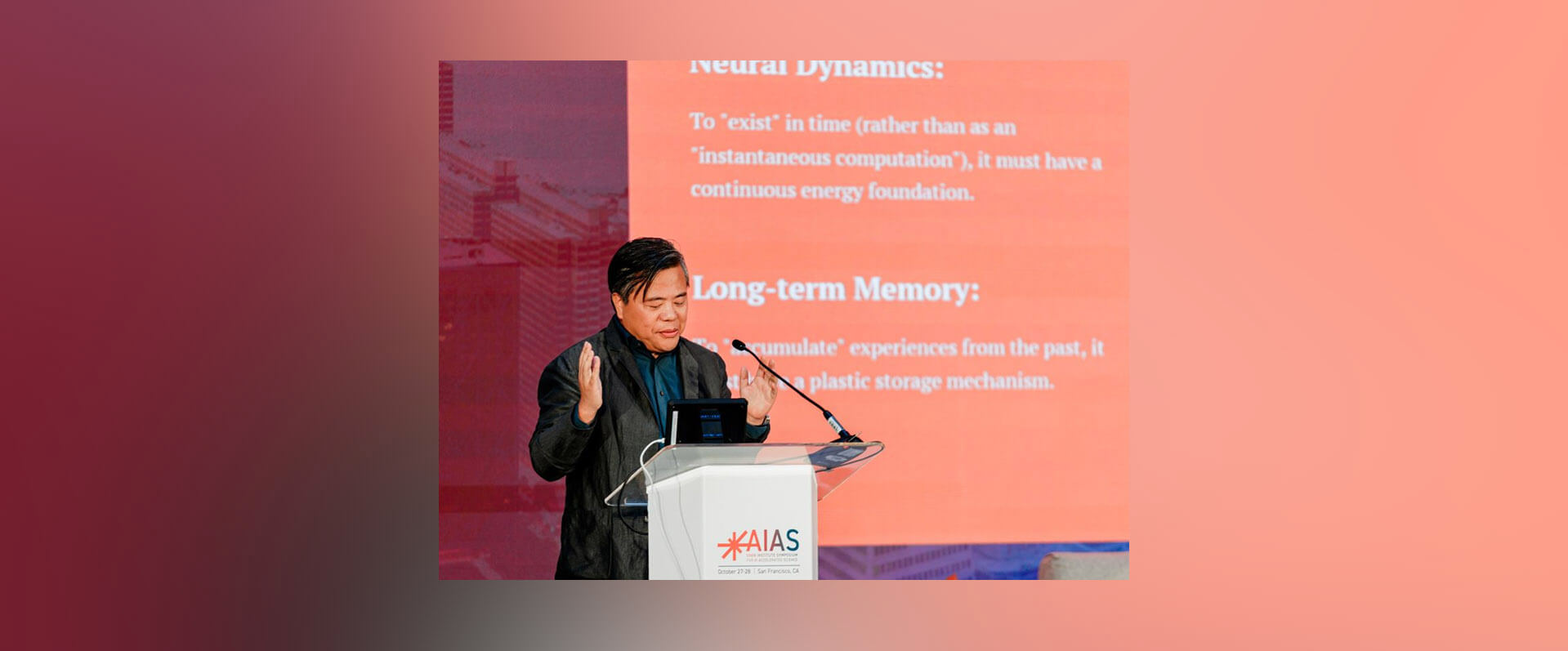TCCI 2023 Annual PI Conference: Pressing Ahead with “3521” Strategy, Bringing New Breakthroughs for Brain Science
Announcements
|
Feb 26, 2023



On February 25, 2023, the Tianqiao and Chrissy Chen Institute 2023 Annual Principal Investigator (PI) Conference was held in Shanghai with Founder Tianqiao Chen and Co-founder Chrissy Luo attending. During the conference, Chen summarized TCCI’s past research and achievements and proposed a “3521” strategy to further advance brain science research.
“When TCCI was founded in 2016, we knew what we wanted to do, and that was to support brain science research,” said Chen. “However, we have spent a long time considering and exploring the question of ‘how exactly to do it’, and now we have the answer, which is the ‘3521’ strategic ecosystem blueprint.”

Chen explained that after in-depth conversations with nearly 400 scientists around the world, TCCI found three pain points prevalent in the field of brain science: interdisciplinary gaps, lack of training and funding for young scientists, and a long and complicated cycle for publishing papers.
To address these pain points, TCCI has focused on five priorities, namely, promoting interdisciplinary collaboration by supporting scientific conference exchanges, running Summer Schools with top academic institutions to nurture young scientists, creating media that promotes publications in scientific journals, setting up Chen Frontier Labs to explore new types of research, and funding outstanding research institutions and scientists around the world.
Going forward, TCCI also sees two major opportunities: artificial intelligence (AI) and block chain technology, which are expected to be effective tools to drive breakthroughs in scientific research.
In response to the above-mentioned issues, challenges and opportunities, Chen has personally led the creaton of one key platform, Socratic Lab. A global online community for brain science researchers, version 1.0 has been launched on a trial basis in 2022., The site has attracted nearly 5,000 scientists from around the world to participate in more than 100 scientific conferences online and it generated lively debate and discussions which produced nearly 1,000 academic questions. Version 2.0 of the community platform is currently under development, focusing more on building an online international community focused on asking and answering academic questions and a virtual lab which encourages scientists to propose hypotheses and innovative solutions based on interdisciplinary communications and interactions. The Socratic Lab also provides innovative tools support the development of scientific solutions.
TCCI’s founders also touched on the progress of the Chen Frontier Lab for Applied Neurotechnology which has achieved significant milestones in the development of a home-use, wearable smart EEG monitoring device and sleep regulation technology. This device is being developed in collaboration with UESTC and Huashan Hospital. The Lab is also developing an eye movement tracking technology to assess mental health in collaboration with Zhejiang University. Other projects such as digital behavioural screening for depression in collaboration with SMHC and an invasive EEG signal collection platform are under accelerated development in collaboration with Huashan Hospital.
In addition to scientific research, TCCI also established a program that, in 2022, supported over 160 conferences worldwide. In 2023, TCCI will organize their own signature conferences around music and the brain and rare brain diseases, with a focus on collaborative academic exchanges in the field of neurotechnology and on funding research conferences related to disorders such as sleep, depression and anxiety.
Professor Zhili Huang, TCCI researcher and President of Chinese Sleep Research Society, shared his thoughts on promoting the development of the sleep industry; Professor Tifei Yuan, Executive Director of Brain Health Institute, Shanghai Mental Health Center (SMHC), presented cutting-edge research on hibernation in non-hibernating animals and precise diagnosis of mental illness; Professor Jintai Yu, Deputy Director of Neurology Department, Huashan Hospital, shared the achievements of large cohort studies on Alzheimer’s disease. Professors Dezhong Yao, Tiger Tao and Zhiguo Wang introduced their latest research and developments around home-use wearable smart EEG monitoring devices, flexible brain-machine interface electrodes and eye-movement tracking technology. Associate Professor Ruyuan Zhang discussed the impact of organising an online academic community for young scientists called Neurochat.
On February 25, 2023, the Tianqiao and Chrissy Chen Institute 2023 Annual Principal Investigator (PI) Conference was held in Shanghai with Founder Tianqiao Chen and Co-founder Chrissy Luo attending. During the conference, Chen summarized TCCI’s past research and achievements and proposed a “3521” strategy to further advance brain science research.
“When TCCI was founded in 2016, we knew what we wanted to do, and that was to support brain science research,” said Chen. “However, we have spent a long time considering and exploring the question of ‘how exactly to do it’, and now we have the answer, which is the ‘3521’ strategic ecosystem blueprint.”

Chen explained that after in-depth conversations with nearly 400 scientists around the world, TCCI found three pain points prevalent in the field of brain science: interdisciplinary gaps, lack of training and funding for young scientists, and a long and complicated cycle for publishing papers.
To address these pain points, TCCI has focused on five priorities, namely, promoting interdisciplinary collaboration by supporting scientific conference exchanges, running Summer Schools with top academic institutions to nurture young scientists, creating media that promotes publications in scientific journals, setting up Chen Frontier Labs to explore new types of research, and funding outstanding research institutions and scientists around the world.
Going forward, TCCI also sees two major opportunities: artificial intelligence (AI) and block chain technology, which are expected to be effective tools to drive breakthroughs in scientific research.
In response to the above-mentioned issues, challenges and opportunities, Chen has personally led the creaton of one key platform, Socratic Lab. A global online community for brain science researchers, version 1.0 has been launched on a trial basis in 2022., The site has attracted nearly 5,000 scientists from around the world to participate in more than 100 scientific conferences online and it generated lively debate and discussions which produced nearly 1,000 academic questions. Version 2.0 of the community platform is currently under development, focusing more on building an online international community focused on asking and answering academic questions and a virtual lab which encourages scientists to propose hypotheses and innovative solutions based on interdisciplinary communications and interactions. The Socratic Lab also provides innovative tools support the development of scientific solutions.
TCCI’s founders also touched on the progress of the Chen Frontier Lab for Applied Neurotechnology which has achieved significant milestones in the development of a home-use, wearable smart EEG monitoring device and sleep regulation technology. This device is being developed in collaboration with UESTC and Huashan Hospital. The Lab is also developing an eye movement tracking technology to assess mental health in collaboration with Zhejiang University. Other projects such as digital behavioural screening for depression in collaboration with SMHC and an invasive EEG signal collection platform are under accelerated development in collaboration with Huashan Hospital.
In addition to scientific research, TCCI also established a program that, in 2022, supported over 160 conferences worldwide. In 2023, TCCI will organize their own signature conferences around music and the brain and rare brain diseases, with a focus on collaborative academic exchanges in the field of neurotechnology and on funding research conferences related to disorders such as sleep, depression and anxiety.
Professor Zhili Huang, TCCI researcher and President of Chinese Sleep Research Society, shared his thoughts on promoting the development of the sleep industry; Professor Tifei Yuan, Executive Director of Brain Health Institute, Shanghai Mental Health Center (SMHC), presented cutting-edge research on hibernation in non-hibernating animals and precise diagnosis of mental illness; Professor Jintai Yu, Deputy Director of Neurology Department, Huashan Hospital, shared the achievements of large cohort studies on Alzheimer’s disease. Professors Dezhong Yao, Tiger Tao and Zhiguo Wang introduced their latest research and developments around home-use wearable smart EEG monitoring devices, flexible brain-machine interface electrodes and eye-movement tracking technology. Associate Professor Ruyuan Zhang discussed the impact of organising an online academic community for young scientists called Neurochat.


















